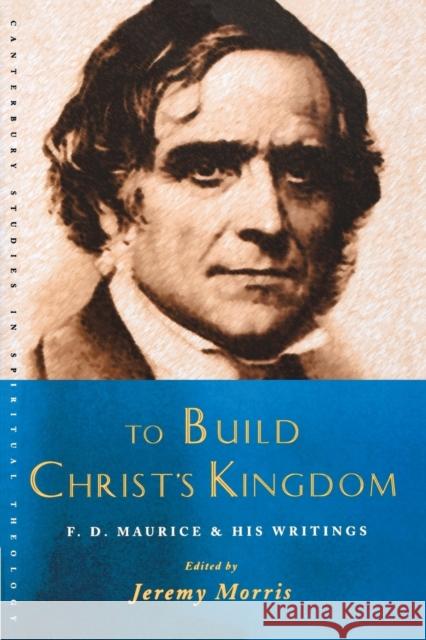To Build Christ's Kingdom: An F.D.Maurice Reader » książka
To Build Christ's Kingdom: An F.D.Maurice Reader
ISBN-13: 9781853117770 / Miękka / 2007 / 158 str.
Among the great thinkers and writers who have shaped the understanding and practice of Anglicanism, the influence of Frederick Denison Maurice (1805-72) is immense. The Anglicanism of F. D. Maurice's day was scarcely a distinct tradition at all It was simply the religion of the established Church in England, Wales and Ireland. Although it had been exported overseas with colonial expansion, there was as yet no notion of an Anglican Communion, while a series of crises between Church and State was undermining its status at home. Emerging Evangelical and Tracrarian movements were each trying to claim the soul of the Church for themselves and new approaches to biblical study were calling into question the very essentials of orthodox Christian belief Into all this stepped E D. Maurice who pioneered a creative response to the critical challenges of modernity and to theological disagreement. He established a pattern of reflection and negotiation, and introduced the concept of a Church that could he comprehensive. Today, these are the defining qualities of Anglicanism. Tr) him, the Anglican Church owes its theology of ministry, its doctrines of atonement, Incarnation and the Trinity, its ideas of heaven and hell, its exercise of social responsibility. He profoundly influenced the classic Anglican formula of 'scripture, creeds, sacrament and episopacy' which has guided Anglican approaches to inter, church relations ever since. Maurice's original writing is engaging and exciting, imaginative and passionate. This reader draws on sermons, pamphlets as well as his classic texts. An introductory essay explores the man and his remarkable legacy. Jeremy Morris is Dean of Trinity Hall, Cambridge and is author of F D Maurice and the Crisis of Christian Authority (OUP). CANTERBURY STUDIES IN SPIRITUAL THEOLOGY collects together the writings of outstanding figures who have shaped core Anglican belief, practice and identity. The series makes available once again many classic texts, selected and edited for modern readers. At a time when the Church faces many challenges, from within its own ranks as well as from the secular world, this series aims to help clergy and laity alike think, act and respond to the complexities of the age with greater confidence.
Among the great thinkers and writers who have shaped the understanding and practice of Anglicanism, the influence of Frederick Denison Maurice (1805-72) is immense.The Anglicanism of F. D. Maurices day was scarcely a distinct tradition at all It was simply the religion of the established Church in England, Wales and Ireland. Although it had been exported overseas with colonial expansion, there was as yet no notion of an Anglican Communion, while a series of crises between Church and State was undermining its status at home. Emerging Evangelical and Tracrarian movements were each trying to claim the soul of the Church for themselves and new approaches to biblical study were calling into question the very essentials of orthodox Christian beliefInto all this stepped E D. Maurice who pioneered a creative response to the critical challenges of modernity and to theological disagreement. He established a pattern of reflection and negotiation, and introduced the concept of a Church that could he comprehensive. Today, these are the defining qualities of Anglicanism. Tr) him, the Anglican Church owes its theology of ministry, its doctrines of atonement, Incarnation and the Trinity, its ideas of heaven and hell, its exercise of social responsibility. He profoundly influenced the classic Anglican formula of scripture, creeds, sacrament and episopacy which has guided Anglican approaches to inter,,church relationsever since.Maurices original writing is engaging and exciting, imaginative and passionate. This reader draws on sermons, pamphlets as well as his classic texts. An introductory essay explores the man and his remarkable legacy.Jeremy Morris is Dean of Trinity Hall, Cambridge and isauthor of F D Maurice and the Crisis of Christian Authority (OUP).CANTERBURY STUDIES IN SPIRITUAL THEOLOGY collectstogether the writings of outstanding figures who have shapedcore Anglican belief, practice and identity. The series makesavailable once again many classic texts, selected and edited formodern readers.At a time when the Church faces many challenges, from within its own ranks as well as from the secular world, this series aims to help clergy and laity alike think, act and respond to the complexities of the age with greater confidence.











